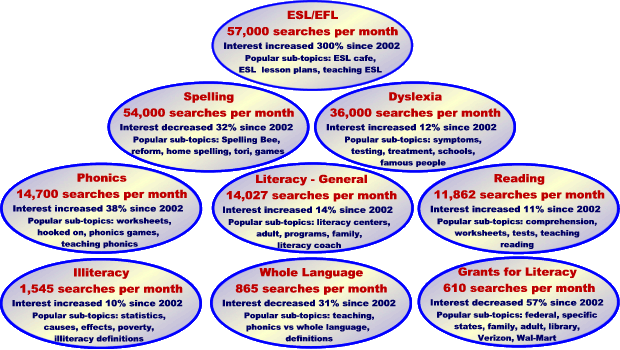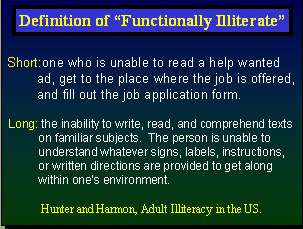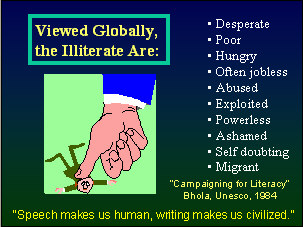
Other Related Pages: ALC Contact Intormation Site Map Close This Window
This ALC Web Site Portal Is A Unique Doorway
The volume of materials related to English literacy is astounding. In your lifetime you could not review or summarize the 51 million documents and resources that result from a simple Google search for "English Literacy." The scope includes historic materials dating back to the origins of the English language, and forward to current medical research related to Aphasia and Dyslexia.
There are dozens of small "web rings" of Internet sites related to literacy. They enable interested people to easily click from one literacy web site to another within some topical areas of literacy. Here are examples of web rings related to literacy but take note of their limitations below the table.
| Teacher Net web ring | Handwriting for kids web ring | Literacy web ring | ||
| Writing web ring | English spelling reform web ring | Literacy teachers web ring | ||
| EduBlog web ring | Technology of the book web ring | First grade web ring | ||
| Story telling web ring | Children's literature web ring | ESL web ring | ||
| Children's books web ring | Elementary teachers web ring | Dyslexia web ring |
There are typically less than 20 sites in each web ring because the site owners have to voluntarily register their sites into one or more web rings. These sites may or may not be updated regularly. They may represent personal viewpoints that have not been tested in practice. They may hope to sell workbooks or teaching materials. They may or may not be funded organizations.
In contrast, ALC has researchers and scholars who scan the Internet for ideas, materials, and new writings in all of the literacy categories. The ALC aims to maintain this site as a super index of evolving concepts and discoveries related to literacy. Such sites are often called "portals" - meaning "a general entrance path to a large body of knowledge."
We know the areas in which people are searching for literacy information. There are monthly counts of how many people actually search for the topics listed in the chart below. Several companies such as Neilson Ratings, Google, and Overture have counters that keep track of every search performed by the public. From these numbers you can see exactly the literacy topics we ought to be tracking in service to the public that seeks literacy information. The numbers show how many people each month (on average) were actively searching in these areas.

Further breakdown of specific topical areas can be found throughout this site. They're shown more fully in the statistical pages [Direct jump to Statistics Section] In the past five years, about 120 new keywords or phrases are being used when people search for literacy-related topics. No one thought to use these terms in 2002 when doing searches on the Internet. At least there are no recorded instances of anyone searching for these terms: Here are the top eight new terms and number of people searching by using these phrases:
| Literacy Coach, 655 | Literacy Education, 623 | |||
| Commercial Literacy Writings, 594 | Literacy Grants, 544 | |||
| Literacy Strategy, 543 | Language and Literacy, 469 | |||
| Literacy Assessment, 404 | Literacy Lesson Plan, 319 |
There are dozens of levels of illiteracy and therefore dozens of definitions of what constitutes a literate or illiterate person. As a starting point, these two informal statements are commonly used as at the beginning of any conversation.


SUMMARY: This ALC web site aims to provide a unique doorway into the world of literacy writings and materials. Take a single word - ESL - and do a Google search. Currently it produces
7,830,000 results. Few people have time to read beyond the first three pages of results. In contrast, this web site promises to "perform due diligence," providing summaries, links, and reviews of the latest concepts, facts, and tools. We want families and professionals to be equipped and energized in the struggle for a literate population. We hope you can lift non-reading persons out of their unimpowered state into the circle of literate citizens.